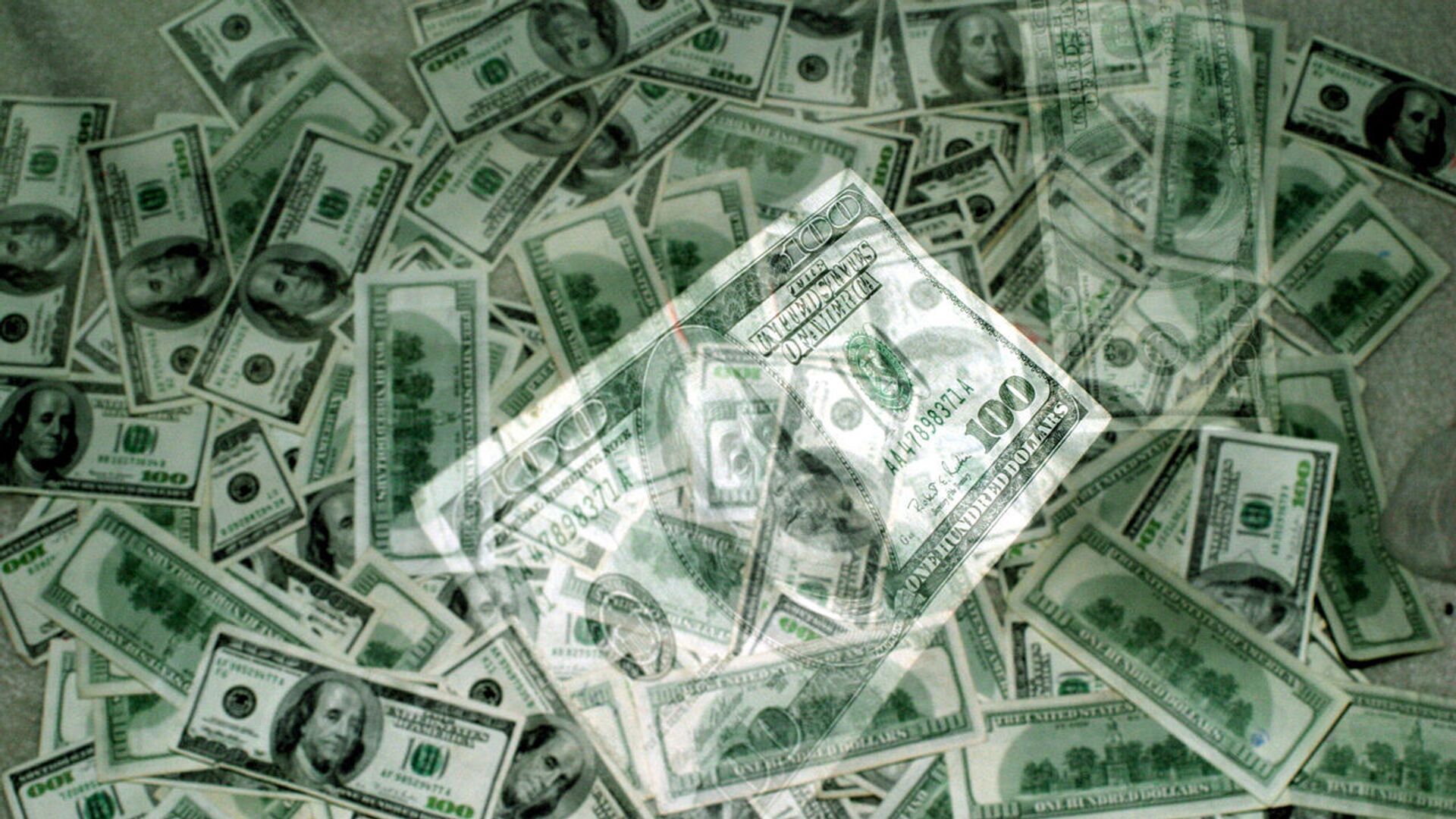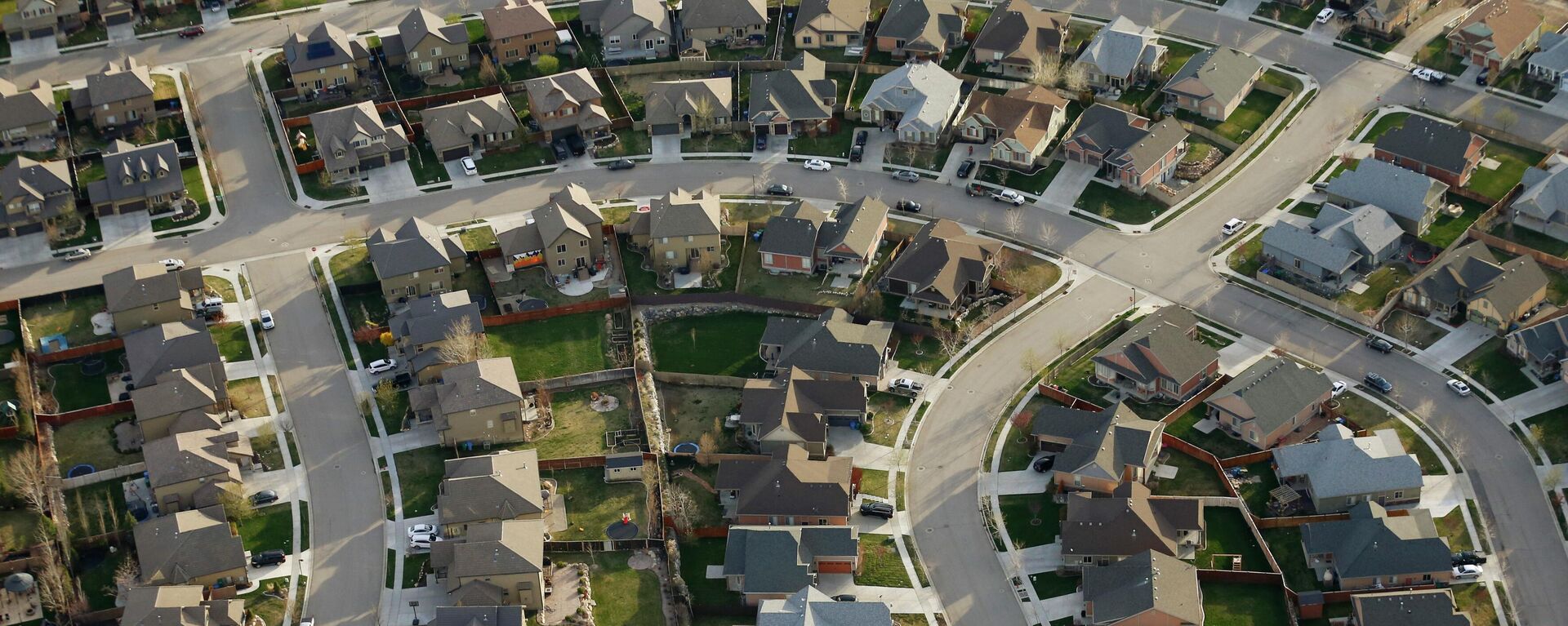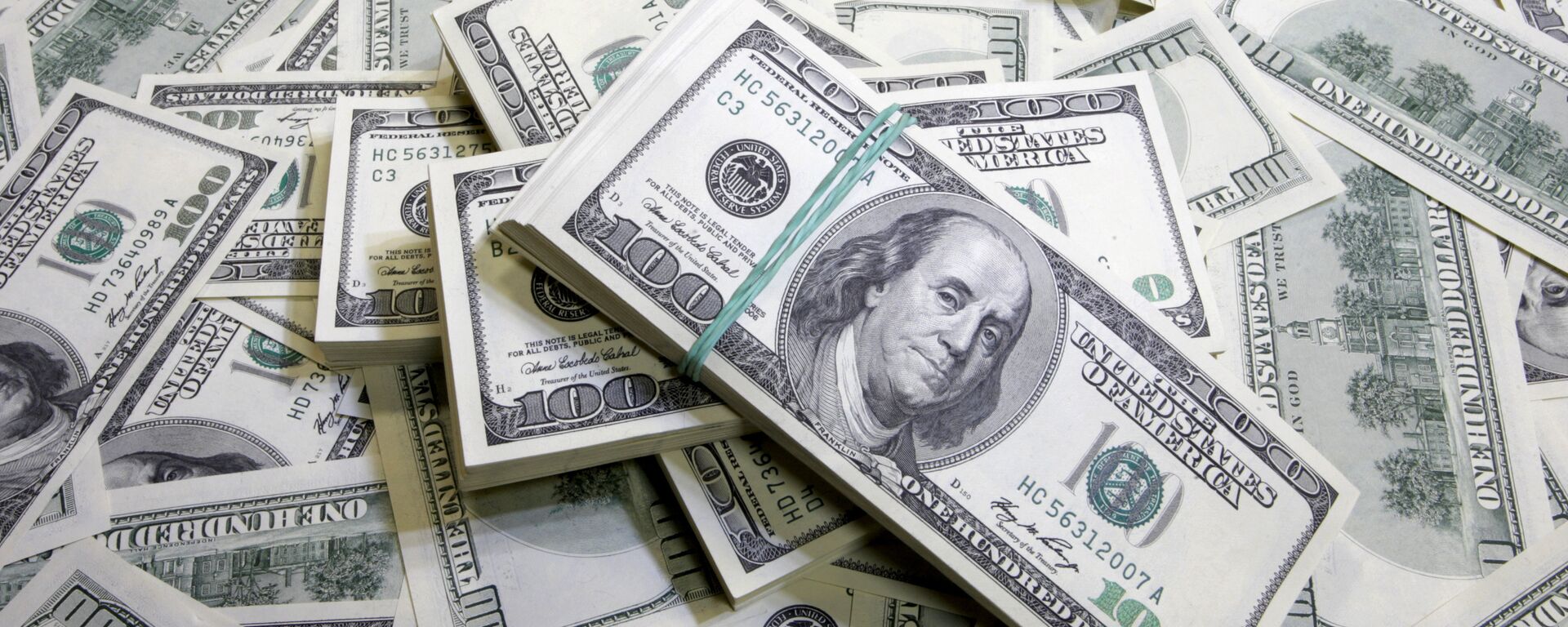https://sputnikglobe.com/20220518/is-the-us-economy-doomed-to-plunge-into-recession-1095613937.html
Is the US Economy Doomed to Plunge Into Recession?
Is the US Economy Doomed to Plunge Into Recession?
Sputnik International
Harry Wilson, a candidate for governor of New York, recently warned that under President Joe Biden, a potential recession may be "more complicated, harder to... 18.05.2022, Sputnik International
2022-05-18T18:48+0000
2022-05-18T18:48+0000
2022-08-08T12:08+0000
us
recession
joe biden
us federal reserve
economy
sputnik explains
https://cdn1.img.sputnikglobe.com/img/07e5/02/13/1082127479_0:67:1280:787_1920x0_80_0_0_6b060e6bb065c7d7c2840c120c305b08.jpg
The Federal Reserve has yet to tame US inflation, which remains at a level unseen since the 1980s. To thwart the worrisome trend, the Fed started to gradually increase interest rates in March 2022. Earlier this month, Federal Reserve Chair Jerome Powell raised benchmark borrowing rates by half a percentage point, vowing to back interest rate hikes until prices start falling toward a healthy level, according to CNBC. However, the Fed's assertive hikes have prompted fears of a looming recession.He believes that the crisis is not imminent: "There is considerable pent-up demand in the US that will provide cushion for the blow to the economy from the recent spike in mortgage rates, and we assume that US GDP will continue to grow at its capacity constraint in the 3.6% area through 2022 regardless of yield swings as businesses struggle to restock empty shelves".Englund hopes that year-on-year inflation metrics will fall later in 2022 as various bottlenecks for supply chains are cleared up via increasing domestic production, a slowing in US demand growth, and economic weakness abroad stemming from the Ukraine crisis. At the same time, the economist admitted that food prices are likely to remain elevated globally "in response to the supply drop".However, Goldman Sachs Senior Chairman Lloyd Blankfein appears to be more pessimistic: he warned businesses and consumers on Sunday that the recession risk is "very, very high", albeit "not baked in the cake". In April, Goldman put the recession odds at 38%; now these odds are rising, according to the financial institution.What's worse, the looming recession may backfire on the US dollar, which is currently "highly overvalued", Goldman analysts said in a note earlier this month. It's unclear whether the greenback's strength will hold in the event of a recession, according to them.Meanwhile, a whopping 68% of American CEOs surveyed by The Conference Board expect that the Fed's attempts to tame inflation will trigger a recession, according to CNN. The US economy unexpectedly shrank 1.4% in the first quarter this year, for the first time since the beginning of the COVID pandemic, according to the US Commerce Department. The slump marked a reversal from a 6.9% annual growth rate in the fourth quarter of 2021, adding to simmering fears of an economic slowdown.Federal Gov't Can Still Save the EconomyIf the federal government takes a series of measures to support the economy, the US could avoid the economic downturn, says Sergio Rossi, professor of macroeconomics and monetary economics at the University of Fribourg, Switzerland.While the US administration is reluctant to increase public spending – because of the forthcoming midterm elections – it should in fact spend more on two major fronts across the economy, argues the professor.First, the Biden administration "should be an employer of last resort, hiring all those people willing and able to work", according to the economist. Second, it should increase public investment in a series of areas, such as healthcare, transport, and education, also greening the national economy, he notes.Third, both US authorities and firms should "relocate several economic activities within the country’s borders, instead of depending much on China and other Asian countries to satisfy the domestic demand on the product market", the academic insists, citing supply chain disruptions and raw materials shortages.Biden's Policies & Forthcoming MidtermsThe US electorate is growing increasingly concerned about Joe Biden's strategy, with just 39% approving of the job he is doing and 56% disapproving, according to a recent NBC News poll. The upcoming November midterm elections will be a litmus test for Biden and the Democrats.The White House bears at least partial responsibility for the unfolding crisis, according to Englund:"The Biden administration has focused on inflation as a 'price gouging' issue rather than the adverse effect of excessive federal stimulus spending and regulatory restraint on the petroleum industry that is capping the potential for US oil production to grow more quickly".Having assumed the Oval Office, Biden cancelled the Keystone XL crude pipeline and took measures targeting fossil fuels and the energy industry within his "green" agenda. According to US conservatives, these policies gave a boost to gas prices, while Biden's "spending spree" further facilitated inflation."The US electorate is becoming increasingly aware of the costs of environmental policies that limit growth for the petrol-chemical process, which is a core industry for the US industrial economy, and as a result, voter alliances are shifting rapidly", Englund says. "The midterm elections will reveal the shift, which will go beyond the usual losses for an incumbent party".
https://sputnikglobe.com/20220421/us-housing-crisis-untamed-inflation-could-lead-to-recession-analysts-say-1094954235.html
https://sputnikglobe.com/20220512/months-ahead-of-us-midterm-elections-millions-are-being-shelled-out-to-back-candidates-1095475873.html
Sputnik International
feedback@sputniknews.com
+74956456601
MIA „Rosiya Segodnya“
2022
News
en_EN
Sputnik International
feedback@sputniknews.com
+74956456601
MIA „Rosiya Segodnya“
Sputnik International
feedback@sputniknews.com
+74956456601
MIA „Rosiya Segodnya“
us, recession, joe biden, us federal reserve, sputnik explains
us, recession, joe biden, us federal reserve, sputnik explains
Is the US Economy Doomed to Plunge Into Recession?
18:48 GMT 18.05.2022 (Updated: 12:08 GMT 08.08.2022) Harry Wilson, a candidate for governor of New York, recently warned that under President Joe Biden, a potential recession may be "more complicated, harder to solve and just as dire" as the 2008 financial crisis. He echoed Goldman Sachs Senior Chairman Lloyd Blankfein, who earlier urged companies and consumers to gird for a US recession.
The Federal Reserve has yet to tame US inflation, which remains at a level unseen since the 1980s. To thwart the worrisome trend, the Fed started to gradually increase interest rates in March 2022. Earlier this month, Federal Reserve Chair Jerome Powell raised benchmark borrowing rates by half a percentage point, vowing to back interest rate hikes until prices start falling toward a healthy level,
according to CNBC. However, the Fed's assertive hikes have prompted fears of a looming recession.
"It has always been a challenge for the Fed to achieve 'soft landings,' given the long and variable lags between monetary policy changes and economic impact, but it is hardly clear at this point that the Fed is on track for a big policy miss", says Michael R. Englund, principal director and chief economist at Action Economics.
He believes that the crisis is not imminent: "There is considerable pent-up demand in the US that will provide cushion for the blow to the economy from the recent spike in mortgage rates, and we assume that US GDP will continue to grow at its capacity constraint in the 3.6% area through 2022 regardless of yield swings as businesses struggle to restock empty shelves".
Englund hopes that year-on-year inflation metrics will fall later in 2022 as various bottlenecks for supply chains are cleared up via increasing domestic production, a slowing in US demand growth, and economic weakness abroad stemming from the Ukraine crisis. At the same time, the economist admitted that food prices are likely to remain elevated globally "in response to the supply drop".
However, Goldman Sachs Senior Chairman Lloyd Blankfein appears to be more pessimistic: he
warned businesses and consumers on Sunday that the recession risk is "very, very high", albeit "not baked in the cake". In April, Goldman put the recession odds at 38%; now these odds are rising, according to the financial institution.
What's worse, the looming recession may backfire on the US dollar, which is currently "highly overvalued", Goldman analysts
said in a note earlier this month. It's unclear whether the greenback's strength will hold in the event of a recession, according to them.
Meanwhile, a whopping 68% of American CEOs surveyed by The Conference Board expect that the Fed's attempts to tame inflation will trigger a recession,
according to CNN. The US economy unexpectedly
shrank 1.4% in the first quarter this year, for the first time since the beginning of the COVID pandemic, according to the US Commerce Department. The slump marked a reversal from a 6.9% annual growth rate in the fourth quarter of 2021, adding to simmering fears of an economic slowdown.
Federal Gov't Can Still Save the Economy
If the federal government takes a series of measures to support the economy, the US could avoid the economic downturn, says Sergio Rossi, professor of macroeconomics and monetary economics at the University of Fribourg, Switzerland.
"[T]he US federal government must support the labour market, increasing the number of jobs in the public sector – with a wage level that allows workers to have enough purchasing power – so that private sector firms will increase production and employment, possibly with a higher wage level, too", Rossi explains. "The US Federal Reserve should not increase further its policy rate of interest before long, but increase its purchases of US government bonds across the primary market, thereby financing public deficits with a view to kick-start economic growth and thereby support employment across the US".
While the US administration is reluctant to increase public spending – because of the forthcoming midterm elections – it should in fact spend more on two major fronts across the economy, argues the professor.
First, the Biden administration "should be an employer of last resort, hiring all those people willing and able to work", according to the economist. Second, it should increase public investment in a series of areas, such as healthcare, transport, and education, also greening the national economy, he notes.
Third, both US authorities and firms should "relocate several economic activities within the country’s borders, instead of depending much on China and other Asian countries to satisfy the domestic demand on the product market", the academic insists, citing supply chain disruptions and raw materials shortages.
Biden's Policies & Forthcoming Midterms
The US electorate is growing increasingly
concerned about Joe Biden's strategy, with just 39% approving of the job he is doing and 56% disapproving,
according to a recent NBC News poll. The upcoming November midterm elections will be a litmus test for Biden and the Democrats.
"This crisis could much damage the Democrats, since a number of people across the US economy could decide to switch and vote for the Republicans, to give a strong signal to the Biden administration that they have been largely disappointed by its own policy and want to revert to a kind of Trump-like administration", suggests Rossi.
The White House bears at least partial responsibility for the unfolding crisis, according to Englund:
"The Biden administration has focused on inflation as a 'price gouging' issue rather than the adverse effect of excessive federal stimulus spending and regulatory restraint on the petroleum industry that is capping the potential for US oil production to grow more quickly".
Having assumed the Oval Office, Biden cancelled the Keystone XL crude pipeline and took measures targeting fossil fuels and the energy industry within his "green" agenda. According to US conservatives, these policies gave a boost to gas prices, while Biden's "spending spree" further facilitated inflation.
"The US electorate is becoming increasingly aware of the costs of environmental policies that limit growth for the petrol-chemical process, which is a core industry for the US industrial economy, and as a result, voter alliances are shifting rapidly", Englund says. "The midterm elections will reveal the shift, which will go beyond the usual losses for an incumbent party".






